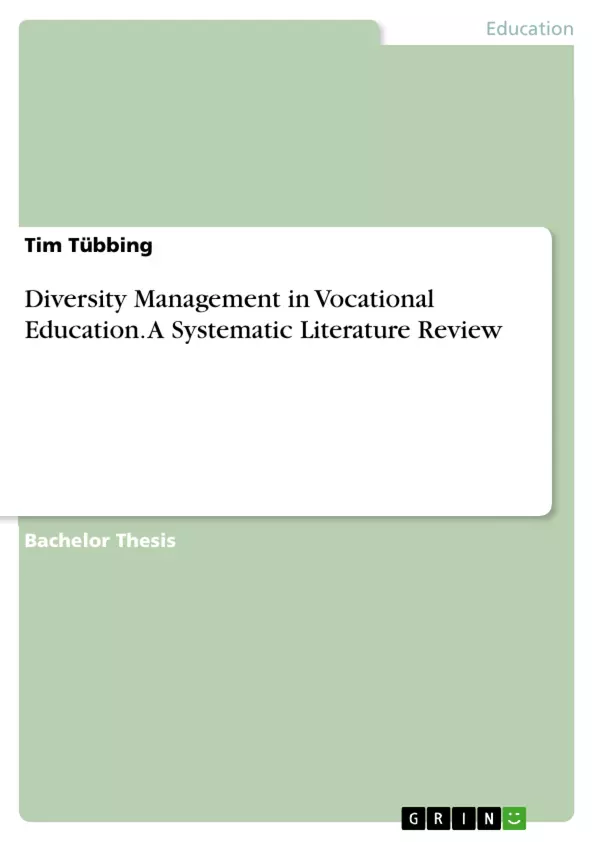The bachelor's thesis examines how the approach of Diversity Management can be applied in vocational education and what competencies educators need to do so effectively. Through a systematic literature review, relevant studies are analyzed to develop a competence profile for interculturally professional educators.
Key aspects include fostering an open, appreciative attitude toward diversity and recognizing diversity as an opportunity in teaching. The thesis emphasizes the necessity of specific competencies such as cultural sensitivity, problem-solving skills, and professional conflict management.
Additionally, it highlights that educators should promote social relationships among learners, create a supportive learning environment, and incorporate cultural content into the curriculum.
In conclusion, the importance of continuous professional development for educators is underscored, enabling them to develop and apply intercultural competencies. The thesis calls for a stronger integration of diversity orientation in teacher training to meet the challenges posed by an increasingly diverse student body.
Inhaltsverzeichnis (Table of Contents)
- 1. Introduction
- 2. Main Section
- 2.1. Definitions
- 2.1.1. Diversity
- 2.1.2. Cultural Diversity
- 2.1.3. Intercultural Competence
- 2.2. Challenges Due to Cultural Diversity in Vocational Education
- 2.3. Diversity Management
- 2.3.1. Fundamentals of Diversity Management
- 2.3.2. Measures of Diversity Management Programs
- 2.4. Diversity Management in Vocational Education
- 2.5. Standard of Pedagogical Professionals in Vocational Education
- 2.5.1. Teacher's Personality
- 2.5.2. Content and Curricular Planning
- 2.5.3. Design of Learning Processes and Methods
- 2.5.4. Social Relationships of Learners
- 2.5.5. Dealing with Language
- 2.5.6. Cooperation and Participation in Organizational Development
- 2.6. Methodology
- 2.6.1. Systematic Literature Review
- 2.6.2. Qualitative Content Analysis
- 2.6.2.1. What is Qualitative Content Analysis?
- 2.6.2.2. Basic Procedures of Qualitative Content Analysis
- 2.6.2.3. Basic Principles of Qualitative Content Analysis
- 2.6.2.4. Procedure According to Mayring's Content-Analytical Process Model
- 2.1. Definitions
- 3. Results
- 3.1. Brief Presentation of the Studies
- 3.2. Summary of the Results
- 3.3. The Expanded Competency Profile of the Interculturally Professional Teacher
- 4. Diskussion
- 5. Conclusion
- 6. Outlook
Zielsetzung und Themenschwerpunkte (Objectives and Key Themes)
This bachelor's thesis aims to determine how diversity management can be applied in vocational education and to identify the necessary teacher competencies for its effective implementation. It explores the challenges posed by cultural diversity in vocational education and seeks to develop a competency profile for teachers to effectively address these challenges.
- Diversity management in vocational education
- Intercultural competencies of teachers
- Challenges of cultural diversity in vocational settings
- Competency profile for interculturally competent vocational educators
- Application of diversity management principles in educational contexts
Zusammenfassung der Kapitel (Chapter Summaries)
Chapter 1: Introduction introduces the context of increasing cultural diversity in German vocational education and highlights the insufficient handling of this diversity within the existing system. It establishes the need for a more proactive approach, leading to the central research question.
Chapter 2: Main Section provides definitions of key terms, such as diversity, cultural diversity, and intercultural competence. It then delves into the challenges presented by cultural diversity within vocational education and introduces the concept of diversity management, exploring its fundamentals and practical measures. The chapter also explores the existing pedagogical standards for vocational educators and examines various aspects of teaching practice in relation to cultural diversity, such as curricular planning, learning process design, and social relationships within the classroom.
Chapter 3: Results presents a summary of relevant studies focusing on intercultural competencies in teachers, analyzing their findings within established categories such as personality, curriculum inclusion, learning process design, and relationship building.
Schlüsselwörter (Keywords)
Diversity management, vocational education, intercultural competence, cultural diversity, teacher training, Germany, competency profile, inclusion, migration background.
- Citation du texte
- Tim Tübbing (Auteur), 2021, Diversity Management in Vocational Education. A Systematic Literature Review, Munich, GRIN Verlag, https://www.grin.com/document/1513275



